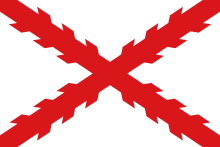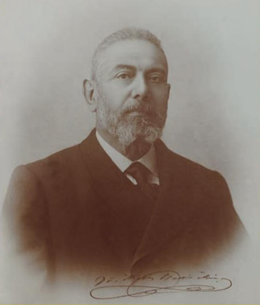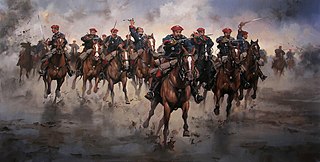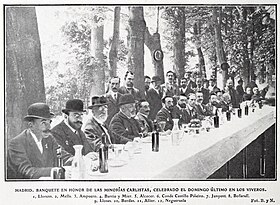Matías Barrio y Mier
Matías Barrio y Mier | |
|---|---|
| Born | Matías Barrio y Mier 1844 Spanish |
| Occupation | politician |
| Known for | academic, politician |
| Political party | Carlism |
Matías Barrio y Mier (1844–1909) was a Spanish law academic and a Carlist politician. He served as a scholar of
Family and youth
Matías Barrio y Mier was born in a mountainous village of

In 1859 Barrio moved to
In 1871 Matías Barrio married an
Academic
Matías Barrio commenced his teaching career as an interim assistant professor in Valladolid in 1864-65,

Expulsed to
In 1881 Barrio commenced his 11-year-spell at

His fundamental work is the monumental Historia general del derecho español,
Public servant
During his university years of early 1860s Barrio was active in the

Some sources claim that he unsuccessfully ran for the
As a deputy he is recorded for calm logic rather than hyperbolic rhetoric;[57] he is not noted as an impressive speaker,[58] though remembered as a respectful, non-aggressive and conciliatory MP, even towards the Republican deputies.[59] During 15 years of service his interventions ranged from local Palentine issues (road construction and maintenance, subsidies to local institutions, relief for victims of natural disasters, pension rights, railway lines, also defense of peasants accused of rural property crimes) [60] to national and international matters. As an expert in law, he chaired the Comisión de Codificación and was counselor to Ministry of Education.[61] As a Carlist deputy he spoke in defense of the Church[62] and is noted for condoning atrocities committed by the Catholic missionaries in the Spanish Guinea Equatorial.[63] In June 1898 as leader of Carlist minority he abstained from giving advice when the prime minister Sagasta consulted the parties on continuation or termination of the war with the United States,[64] though 3 months later he voiced against accepting the Washington Protocol and along few deputies signed a manifesto to the nation, denouncing the treaty.[65]
Carlist
It was his parents, both fundamentally Carlist,

Little is known about Barrio's Carlist activity in the 1880s, though he was probably busy rebuilding the Traditionalist network in León. His position in the organization grew once he became a deputy and started speaking in defense of the Carlist cause in the Cortes.[74] With the number of Carlist deputies ranging from 5 to 10, Barrio, along Cesáreo Sanz Escartín, gradually became the most experienced MP and in the late 1890s[75] assumed the post of the Carlist Cortes minority speaker (though the parliamentarian leadership was reserved for the senator, marqués de Cerralbo); by the same time he emerged as the regional Leonese leader and the representative of León in the nationwide structures.[76] He also became one of the movement's pundits, regularly publishing in the semi-official Carlist daily, El Correo Español.[77] In case the Jefe Delegado, marqués de Cerralbo, was out of the country, it was usually Matías Barrio replacing him.[78]
Jefe Delegado
When de Cerralbo resigned as Jefe Delegado in 1899 there were many personalities counting as his potential successors, including
Barrio did not manage to prevent isolated and probably spontaneous outbursts of Carlist insurgency, especially the 1900 Badalona uprising dubbed "La Octubrada".[84] As unlike many Carlist personalities Barrio was spared the resulting governmental repressive action, his primary task turned out to be reconstruction of the party, suffering from closures of circulos, suspension of periodicals and exile of its leaders.[85] The reopening of circulos produced their visible reformatting, with increased female presence and more focus on youth, including sport (especially football).[86] The resumption of press activities produced a conflict with de Mella, already averse towards Barrio,[87] as the claimant ordered his Jefe Delegado to purge El Correo Español of the Mellista influence.[88]
In the early 20th century Matías Barrio was already suffering from
See also
Footnotes
- ISBN 9788417765880, p. 16
- ^ Vallejo García-Hevia 2020, p. 16
- ISSN 0210-7317, 78 (2007), p. 167
- ^ Hijos ilustres del Valle de Redondo, [in:] Origeness Blogspot available here. It is not clear why she appears in documents as "Susana de Mier", since her parents were Simon Morante and Tomasa de Mier, Vallejo García-Hevia 2020, p. 16. In line with standard customs, she would have appeared as "Susana Morante Mier"
- ^ Santiago Francia Lorenzo, Matías Barrio y Mier, [in:] La Pernía, montana palentina website, available here
- ^ Francia Lorenzo
- ^ Carlos Petit, Barrio y Mier, Matías (1844-1909) entry, [in:] Diccionario de Catedráticos Españoles de Derecho (1847-1943) at Universidad Carlos III de Madrid website, available here
- ^ Carlos Petit
- ^ Santiago Francia Lorenzo, Territorio Perniano. Un manuscript de Matías Barrio y Mier en el Archivio Capitular de Palencia, [in:] PITTM 71 (2000), p. 455
- ^ Carlos Petit
- ^ following the work on Teoría fundamental de las circunstancias atenuantes y agravantes de los delitos, Carlos Petit, see also Froilán de Lózar, p. 169
- ^ the thesis was on Idéa de las fuentes del conocimiento historico, Carlos Petit
- ^ Carlos Petit; Francia Lorenzo (2000), p. 455 gives the name as Escuela Superior Diplomática
- ^ According to Petit Barrio studied theology for 2 years; Francia Lorenzo claims Barrio graduated in theology p. 455, Froilán de Lózar, p. 169 says that the 1868 revolution interrupted Barrio's theology studies, but he later resumed them and obtained another PhD
- ^ Carlos Petit
- ISBN 8427712308, 9788427712300, p. 100
- ^ Francia Lorenzo
- ^ Vallejo García-Hevia 2020, p. 40
- ^ in 1923 she was entitled to a pension, El Adelanto 27.09.23, available here
- ^ named after his grandfather
- ^ Froilán de Lózar, p. 172; the choice of names reveals zealous Carlist penchant, as they were names of the then claimant and his children, Vallejo García-Hevia 2020, p. 40
- ISBN 8425911524, 9788425911521, pp. 186-187
- ^ Barrio's biographer claims he has never recovered from this blow, Vallejo García-Hevia 2020, p. 205
- ^ La Lectura Dominical 01.10.10, available here
- ^ in the 1910s served as mid-range finance official in Salamanca, Guia Oficial de Espana 1914, available here
- ^ Boletín oficial de la provincia de Cáceres 02.01.37, available here
- ^ Carlos Petit
- ^ Carlos Petit
- ^ Carlos Petit
- ^ Carlos Petit
- ^ Carlos Petit, Froilán de Lózar, p. 169
- ^ Carlos Petit, Froilán de Lózar, p. 169; according to a press obituary he was also a rector, see ABC 24/06/1909, available here
- ^ he challenged the rejection of his application in court; a number of MPs appealed in his favor, see Petit
- ISBN 8437043948, 9788437043944, pp. 193
- ^ Carlos Petit
- ^ see Barrio y Mier, Matías entry [in:] vivirasturias.com
- ^ Carlos Petit
- ^ Carlos Petit
- ^ Carlos Petit, Froilán de Lózar, p. 171; B. de Artagan, Politicos del Carlismo, Barcelona 1913 claims it was in 1906, referred after Blog de la Asociación Cultural Tradicionalista Fernando III el Santo, available here
- ^ Historia general del derecho Español. Extracto taquigráfico de las explicaciones del dr. d. Matías Barrio y Mier, Volumes I-IV, Madrid, no stated date of issue, usually dated at 1900
- ^ vivirasturias.com
- ^ Carlos Petit
- ^ Froilán de Lózar, p. 179
- ^ Francia Lorenzo
- ^ His commitment to the native region was demonstrated also in 1904, when he co-founded Casa de Palencia in Madrid, see Froilán de Lózar, p. 190
- ^ Carlos Petit; Francia Lorenzo says it was in Pisuerga
- ^ Carlos Petit
- ^ Fróilan de Lózar, p. 169
- ^ Carlos Petit
- ^ Carlos Petit
- ^ Carlos Petit; Francia Lorenzo says he had also offices in Valladolid, Burgos and Madrid
- ^ Francia Lorenzo
- ^ though he did not complete the required 25 years of age; allegedly because of his bid he suffered harassment at Universidad Central, see Fróilan de Lózar, p. 169
- ^ Fróilan de Lózar, p. 170 claims that he succeeded in 1872 elections, but his mandate was annulled
- ^ some scholars even label the area as Barrio's political "property" and consider his long career part of the caciquismo phenomenon, see José Varela Ortega 2001, pp. 186-187; a hagiographical biographer attributes his success to popularity among the locals, see Fróilan de Lózar, p. 166 and onwards
- ^ Fróilan de Lózar, pp. 171-172
- ^ Fróilan de Lózar, p. 168
- ^ del Valle, del Valle López, p. 101
- ^ Fróilan de Lózar, pp. 254-255
- ^ Fróilan de Lozar, p. 171
- ^ Carlos Petit
- ^ See many excerpts quoted by Fróilan de Lózar
- ^ During the Cortes session of 29 May 1895, apparently replying to a republican deputy from Cuba, Rafael Maria de Labra y Cadrana, Barrio praised the missionaries, stressing that they work pro de la patria como constants obreros de la civilización, sobre la base indispensable de la enseñanza moral y religiosa. Referring to incident at Cabo San Carlos, when 500 batons administered to a native caused his death, Barrio went on noting that la mala voluntad de algunas personas, ejerciéndose contra esor misionerios, ha querido, sin embargo, sacar partido de algunos hechos aislados que hayan podido ocirrir, casi siempre sin culpa ni intervención de aquellos, pero de los cuales se pretendian deducir graves cargos que en definitive resultan infundiados, see Revista de Geografía Comercial, XI (1895), pp. 223-224, available here
- ^ Europa en 1898 y la Guerra de Estados Unidos con España, [in:] Boletín de la Real Academia de la Historia, vol. CXCV (2), 1998, p. 199
- ^ Europa en… (1998), p. 203-204
- ^ Fróilan de Lózar, 167
- ^ del Valle, del Valle López, p. 100, Fróilan de Lózar, p. 190
- ^ Froilan de Lózar, p. 169-170
- ^ Fróilan de Lózar, p. 170
- ^ ABC 24/06/1909 wrote in Barrio's obituary that he fought for the Carlist cause "with a spade"; not clear whether this was pure retorics or a reference to Barrio's actual combat experience
- ^ together with Lorenzo de Arrieta Mascaria, Conde del Pinar, see Julián Gómez de Maya, El código penal de Don Carlos VII, [in:] Anales de derecho 26 (2008), p. 102
- ^ Agustín Fernández Escudero, El marqués de Cerralbo (1845-1922): biografía politica [PhD thesis], Madrid 2012, p. 42
- ISBN 8460589323, pp. 76-81
- ^ E.g. when intervening about the Carlist political leader, Marques de Cerralbo, assaulted in Valencia, see Escudero 2012, p. 213
- ^ he declared in Cortes: nosotros no somos absolutistas, somos los menos absolutistas, rechazamos el absolutismo que condenamos con energía, reprobamos todos los absolutismos conocidos, somos partidarios de la libertad Cristiana, quoted after Escudero 2012, p. 214
- ^ in 1896 Barrio was heading junta regional, see Escudero 2012, p. 285, and in 1899 was representing León in a number of Carlist initiatives, like the Junta to commemorate conversión de Recaredo, see Escudero 2012, p. 293
- ^ Escudero 2012, p. 332
- ISSN 2172-671X, p. 149
- ^ Escudero 2012, p. 406
- ^ Escudero 2012, p. 374
- ISBN 8400077784, 9788400077785, p. 206
- ^ González Calleja, p. 214
- ^ Carlist leaders among themselves spoke openly about the insurgency and Carlos VII made some moves which might have been interpreted as gearing up for rebellion, see Escudero 2012 pp. 383, 385, 385-402;
- ^ he declared those taking part not being Carlists, Escudero 2012, p. 390 Escudero 2011 (2) p. 73
- ISBN 8496467341, 9788496467347, p. 36, Escudero 2012, p. 408
- ^ Escudero 2012, pp. 408-409, Canal 2006, p. 36
- ^ A friend of the dismissed de Cerralbo, de Mella was reported by the press to hate Barrio and to call him “a camel” due to his posture and coarse look, see Escudero 2012, p. 373-4; see also the anecdote referred by Froilán de Lózar, p. 165: when asked by a journalist about his physis, Barrio replied that “God paints according to His own will”
- ^ see Juan Ramón de Andrés Martín, El control mellista del organo carlista oficial. “El Correo Español” antes de la Gran Guerra, [in:] Aportes. Revista de la Historia Contemporánea 1999 (40/2), pp. 67-78
- ^ de Artagnan 1913 claims his health suffered due to work overload
- ^ consisting of deputies, senators and regional jefes
- ^ Escudero 2012, p. 413-4; the formation of the Junta was led the government to anticipate Carlist uprising and triggered special measures, see González Calleja, p. 339
- ^ E.g. Barrio wrote in El Correo Español that Carlists should afford a sacrifice of going to the polls, see Escudero 2012, p. 415
- ^ following the Third Carlist War the Traditionalists were winning at best 3 of the 7 Navarrese mandates available; in 1903 they won 5, and in 1907 and 1910 they grabbed 6 out of 7 mandates, the remaining one ceded to the allied Conservatives; their domination was broken in 1918, when they slipped to 3 mandates again
- ^ Escudero 2012, p. 416
- Senante Martinez(Gipuzkoa)
- ISBN 9780521207294, pp. 332-333
Further reading
- Baron de Artagan [Reynado de Brea], Politicos del Carlismo, Barcelona 1913
- Juan Ramón de Andrés Martín, El caso Feliú y el dominio de Mella en el partido carlista en el período 1909–1912, [in:] Historia contemporánea 10 (1997), ISSN 1130-0124
- Santiago Francia Lorenzo, Territorio Perniano. Un manuscript de Matías Barrio y Mier en el Archivio Capitular de Palencia, [in:] Publicaciones de la Institución Tello Téllez de Meneses 71 (2000)
- Santiago Francia Lorenzo, Matías Barrio y Mier, [in:] La Pernía, montana palentina website
- Gregorio de la Fuente Monge, Matías Barrio y Mier, [in:] Diccionario Biográfico Español, v. VII, pp. 186–189
- Jordi Canal i Morell, Banderas blancas, boinas rojas: una historia política del carlismo, 1876-1939, Madrid 2006, ISBN 8496467341, 9788496467347
- Agustín Fernández Escudero, La delegación carlista de Matías Barrio y Mier (1899-1909): Continuismo tradicionalista, [in:] Studium: Revista de humanidades 23 (2017), pp. 161–193
- Agustín Fernández Escudero, El marqués de Cerralbo (1845-1922): biografía politica [PhD thesis], Madrid 2012
- Agustín Fernández Escudero, El XVII marqués de Cerralbo (1845-1922). Segunda parte de la historia de un noble carlista, desde 1900 hasta 1922, [in:] Ab Initio: Revista digital para estudiantes de Historia, 4/2011, ISSN 2172-671X
- Eduardo González Calleja, La razón de la fuerza: orden público, subversión y violencia política en la España de la Restauración (1875-1917), Madrid 1998, ISBN 8400077784, 9788400077785
- Froilán de Lózar, La aventura política de Matías Barrio y Mier, [in:] Publicaciones de la Institución Tello Téllez de Meneses, ISSN 0210-7317, 78 (2007), pp. 165–264
- Carlos Petit, Barrio y Mier, Matías (1844-1909), [in:] Diccionario de Catedráticos Españoles de Derecho (1847-1943) at Universidad Carlos III de Madrid website
- Adolfo Posada, Fragmentos de mis memorias, Oviedo 1983, ISBN 8474680700, 9788474680706
- Ángela del Valle, Angela del Valle López, Aportación bio-bibliográfica a la historia de la ciencia: Universidad Central, 1886-1902, Madrid 1998, ISBN 8427712308, 9788427712300
- José María Vallejo García-Hevia, Matías Barrio y Mier (1844-1909): Un historiador del derecho en la cátedra, la política y la guerra, Madrid 2020, ISBN 9788417765880
External links
- detailed academic career at Universidad Carlos III de Madrid
- a literary account of Barrio's political career
- Barrio according to 1913 biographical entry at Asociación Cultural Tradicionalista blog
- Agustín Fernández Escudero. El marqués de Cerralbo (1845-1922). Biografía política
- Agustín Fernández Escudero, El XVII marqués de Cerralbo (1845-1922) Segunda parte
- Barrio and La Pernia
- Barrio's mother family explained
- Barrio at Asturian site
- brief entry at mcnbiografias
- obituary notes
- Barrio and Guinea
- letters from Carlos VII to Barrio (1959 book)
- contemporary Carlist propaganda (video)




